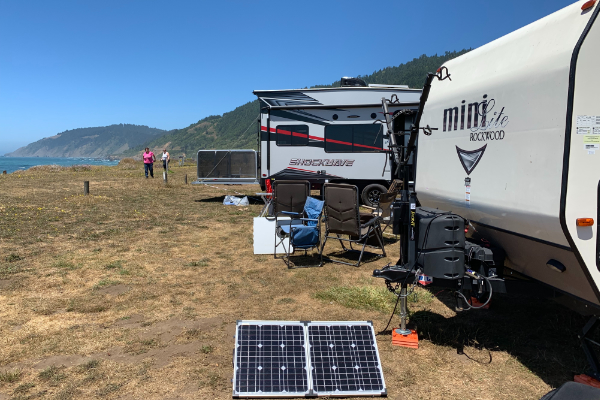
More and more RVers are looking at solar power as way to boondock longer and have a quieter, more pleasant RVing experience. But solar is also very mysterious to many so here is a very basic introduction to solar.
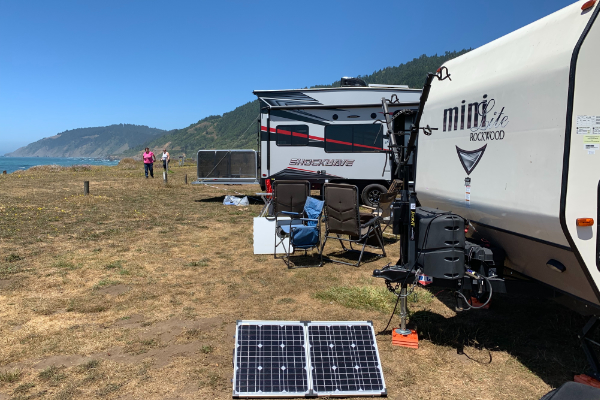
What is solar
Essentially solar power is a way to replenish the battery bank in your RV. It’s that simple. So what can you run with a solar system? Anything you want so long as you’ve got the right system.
While that is a very oversimplified synopsis of solar, there are also so many variables and nuances to consider. Solar is much like computers were in the 1980s, or stereo systems of the 1970s. You could go to a store and build your own system and hope you know what you’re doing, or just go get a complete system installed.
Capabilities
Depending on your own RV and camping style, a solar system can be a simple as a portable panel or as complicated as an array of components that can help run the air conditioners in your RV.
Probably the best way to start is to consider your own camping style and what you want to accomplish and make a list of that. Then make a list of all the components in your RV and, from there, you can start mapping out a solar solution.
Solar systems
The most obvious part of any solar system are the solar panels. But there are many more components to consider to have a working system that does what you want. Like building a home stereo or a computer, you can truly go nuts with individual pieces and components.
Solar panels are always “on” so, the moment they get sunlight, they’re producing power. That can be problematic as you can overcharge batteries and destroy them. As such, you’ll want a device called a charge controller, which takes the power produced by the solar panels and monitors that to optimize the energy supplied to the batteries. The charge controller also regulates the voltage and current going into the battery.
You can also get systems that monitor the charging process that are pretty simple or quite fancy. There are options to control these systems with displays and monitors, Bluetooth, and more. Additionally, the quality of the wiring, connectors and other pieces in this puzzle can make a huge difference in the final outcome of the system.
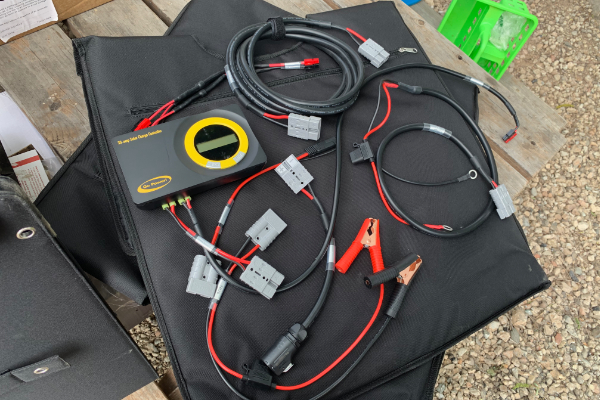
There are also more components to consider depending on what you want your system to do. For example, the simple solar system we had in our previous travel trailer could only run 12-volt systems like lights, pumps, our furnace, and that sort of thing.
Newer systems like the one we have now can help run the household outlets in the RV as well as the air conditioner through a device called an inverter. Many of you may already have one of these if you have a residential refrigerator. These, too, can come in all sizes and capabilities so this is another aspect of these systems where you’ll want to know what demands you have. There are many newer RV systems that no longer need inverters. Many modern RVs have 12-volt refrigerators that offer all the performance of a residential model, but which operate on the 12-volt system. There are also TVs that are 12-volt, again removing the need for an inverter.
Batteries
If you’ve been looking into this at all you might have come across lithium batteries. These offer tremendous energy storage capability more than the typical batteries many towable RVs come with, which are “flooded” lead acid batteries. Flooded batteries have been in vehicles for a very long time.
Some RVs now come with AGM batteries which are a sealed version of the lead acid batteries of yore. These do offer better performance but they’re also really heavy. Both flooded and AGM batteries generally do not do well if they’re discharged by more than half their capacity. Lithium batteries typically have no problem being almost completely depleted. Further, they charge faster because of how they can accept energy and they’re significantly lighter given the same amount of stored energy. For example, we had a single AGM battery in our previous travel trailer which weighed in at 82 pounds. A lithium battery we planned to purchase weighed just 22 pounds and offered double the energy reserves. Lithium batteries can also be more expensive than flooded batteries.
Consumption
It has long been the holy grail of RV solar to be able to run the air conditioning in an RV. I’m here to tell you that our own system does just that. For a certain amount of time.
How long the AC runs depends on so many variables including how much sun we get in a day, how high the ambient temperature is, where the air conditioner is set temperature-wise, and more. We have a single air conditioner in a travel trailer. This unit features “soft start” technology. What this does is minimizes the huge spike in power that air conditioners need when first started up. The bottom line: we can run the AC unit for 5-8 hours on a typical sunny summer’s day.
Since solars only job is to replenish batteries the less power you consume, the further that charge will take you. RV air conditioners have not had to be very efficient in the past only because we take our RVs to RV parks and plug them in. How much power we use doesn’t matter, so long as it doesn’t exceed the amount we’re served by the campground or how much our generator provides. This has allowed RV component suppliers to make relatively simple but power-hungry AC units in the past.
This is changing with the first really modern RV air conditioner coming from German firm Truma. Their “Aventa” model is remarkably efficient, much like how a modern mini split air conditioner is considerably more efficient than traditional models.
Many RVers have also discovered that modern LED lighting is significantly less power hungry than the old-fashioned bulbs, which also had the disadvantage of running hot while consuming a lot of power.
The problem many RVers have of wanting to run things like air conditioners using solar power isn’t as much a solar problem as a consumption problem. I predict that we’re going to see a dramatic change in RV components to much more efficient units in the very near future.
Options
So what kind of system do you want? For years we camped with a simple portable solar panel which served us very well. That system, which incorporated a charge controller, simply clamped to the batteries in the trailer and kept them topped off while we were boondocking.
On our vintage trailer we actually use a Jackery “solar generator” to power everything. Power is no longer a limiting factor with that trailer, it’s now water/tanks that bring us in. The Jackery has three household outlets on it which we use to run all the systems in the vintage trailer. But that vintage trailer does not have an air conditioner, so there is that. We had replaced all the lighting with LED lighting and the trailer was so old there was no consumption by things like the fridge or a propane leak detector since it didn’t have one.
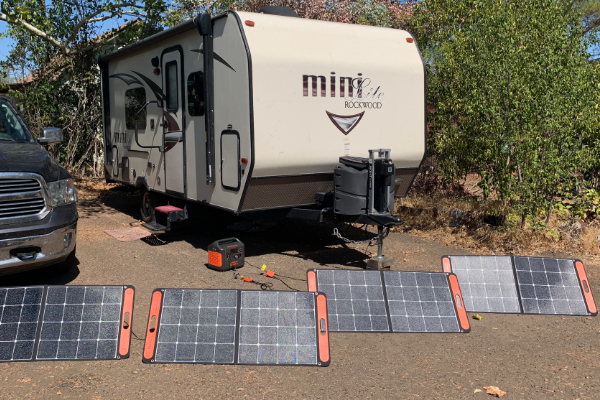
If you use a medical device like a CPAP machine perhaps a solar generator might also be a good solution for you. You can charge these during the day using their solar panels and then bring them in to power these devices overnight. Solar generators have the advantage of running quietly and without any fumes and one of these might be all you need.
This could dramatically simplify life off the grid if this works for you as these systems are typically packaged into one system which simply works.
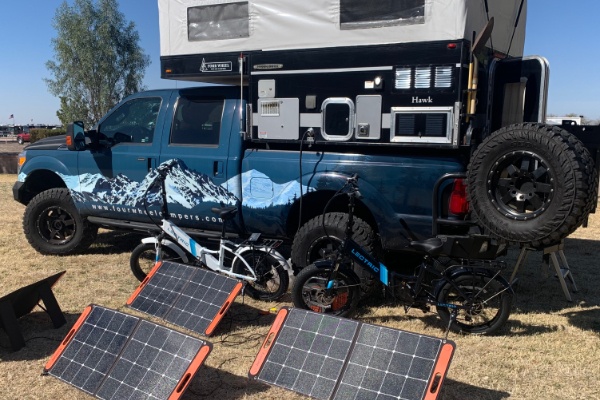
Our own system
Our 2022 Rockwood Mini Lite travel trailer was fitted with an option dubbed the “Power Package.” This includes 1,000 watts of solar and a 400 amp-hour lithium battery along with all supporting components sourced from a company called MasterVolt. This system has been game changing for us as we seldom seek-out full-service campgrounds except to dump our holding tanks and refill our freshwater tank. This is the system that we can run our air conditioner with, and it absolutely has zero issues providing all the power we need to enjoy life off the grid.
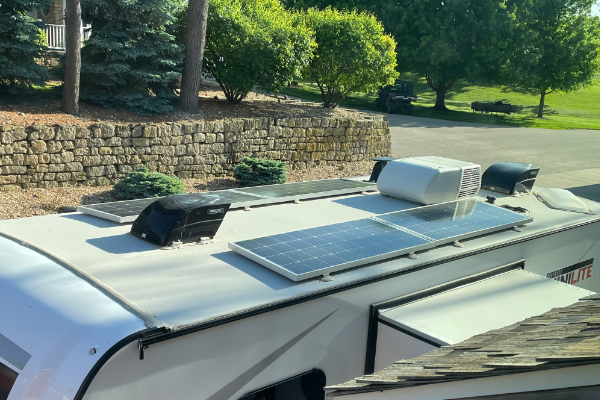
Know that we are also pretty efficient and some of the components in this system are state of the art. For example, we have a 12-volt television, so we don’t need to run the inverter to watch a movie. We use an Aeropress to make our coffee which just uses water we heat on the propane stove top.
We do specifically seek-out camping at higher altitudes or along the shore when it’s hotter, so we also try not to go where we don’t need to run the AC for extended periods of time, but we’ve also camped where that was part of the game plan.
Conclusions
Our own system is just one of many that have popped up in the past couple of years. Keystone RV has really taken a lead in solar by offering it as standard equipment on all their products. They offer factory-supplied systems from mild to incredible. Winnebago has an incredible system in their FLX package trailers such as the one YouTube creator Robert Morales, known as Traveling Robert, has in his own Winnebago.
The RV electricity guru, Mike Sokol, shared with us that a single five-pound bottle of propane has about the same energy equivalent of 100 100-amp hour lithium batteries. There’s still a lot of energy in liquid traditional fuels.
That means you can run generators or cool fridges or do all the things we RVers have been doing for years.
But solar and battery systems continue to evolve. A system like the one in our own trailer was prohibitively complex and frightfully expensive just a few years ago. More efficient RV systems plus better solar and battery systems are converging to make powering your RV while off the grid both effective and more affordable.
Of course, the big advantage of solar is that it’s silent and doesn’t have any long-term costs. But the buy-in can still be prohibitive to some shoppers.
| Tony and Peggy Barthel are RV industry veterans who travel part-time in a small travel trailer looking for fun and unique destinations as well as tips, tricks, and discounts to turn the RV adventure into StressLess Camping. You can catch them Thursday mornings on their podcast or any time at www.StressLessCamping.com. |


Leave a Reply